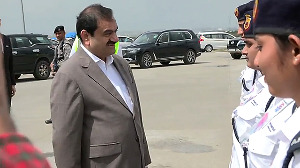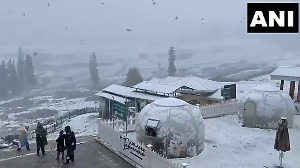After highlighting how the Gujarat police force cracked the Ahmedabad blasts conspiracy and how the they were going about building an airtight case against the terrorists, in this the final part of her 3-part series, Sheela Bhatt describes how the force is trying to overcome its biggest stumbling block: the disbelief over its claim of having cracked the case:
In cracking the Ahmedabad serial blasts case the Gujarat police may have opened a Pandora's box.
It claims to have not only got evidence against those who planned and executed the bomb blasts in Ahmedabad and Surat, but also that it has got definite insights into the conspiracy aspect of the blasts on Samjhauta Express and in Jaipur.
In fact, some unused explosive connected with the blasts on Samjhauta Express was recently recovered by Gujarat police.
In other words, what the Gujarat police is claiming is that the blasts in Hyderabad, Bengaluru, Jaipur, Ahmedabad and probably Samjhauta Express were conceived, planned and executed by the militant faction of the Students Islamic Movement of India formed after 2005. That also means the usual suspects -- like Pakistan's Inter Services Intelligence, Lashkar-e-Tayiba or HUJI of Bangladesh -- can't be blamed for some of the recent blasts that have killed more than 200 innocent Indians.
So far, revelations by the accused suggest that the terror strikes in Bengaluru, Jaipur and Gujarat are made in India and by Indians.
A senior Bharatiya Janata Party leader in Gujarat, whose party is in power in the state, says, "We have not found any external links to SIMI in the execution of the blasts in Ahmedabad and Surat."
The Gujarat police zoomed in on SIMI only after they interrogated Zahid Sheikh of Ahmedabad (who allegedly planted the bomb in the city's civil hospital) and Usman Agarbattiwala of Baroda. Their interrogation, read along with SIMI chief Safdar Nagori and his associate Ameel pervez's statement, made them believe that SIMI, a fiercely political outfit, turned militant after it was banned in 2001.
"Possibly SIMI's role behind the bomb blasts was overlooked while giving attention to the Lashkar-e-Tayiba. The Indian establishment went into slumber after banning SIMI," says a senior police officer in Ahmedabad.
He says four days after the bomb blasts, when the Gujarat police narrowed down their focus to SIMI and picked up Zahid Sheikh from his home in Juhapura, a political leader questioned its judgement in a meeting. "He said SIMI may not have done 'direct action' like planning to kill so many people," the police officer said.
If Nagori's statement had been studied properly, may be the story would have been different.
"It's the height of inefficiency," fumed Ajit Doval, former chief of Intelligence Bureau. "Senior officers are so 'busy' normally that they read only the summary of such confessional statements. In Nagori's statement, the mention of Gujarat and Rajasthan must be in the third paragraph of page number 17," he added, sarcasm dripping from his voice.
"We never got a copy of Safdar Nagori's statement," counters Ashish Bhatia, Ahmedabad's joint commissioner of police who is heading the investigation into the Gujarat blasts. "We were unaware that he has mentioned any plans of subversive activities in Rajasthan and Gujarat. We knew generally about the threat perception, but nothing beyond that."
Naturally, given the credibility problem investigations into terrorism-related suffer from in India, and more so by the Gujarat police in the light of the Sohrabuddin case, the latter's current achievements is looked at either with suspicion or complete disbelief. Any kind of communal violence or terrorism is a delicate issue in India; a number of people -- from whichever community the perpetrators belong to -- inevitably slip into denial mode.
In this case, most experts deemed secular and Muslim leaders do not buy the Gujarat police's version of events. A Bengaluru-based expert on India's madrassas refused to respond to rediff.com because he said the police's findings are based on confessional statements of arrested people, and extracted under pressure.
Doval, however, disagrees. "In the absence of any other evidence I would think the Gujarat police investigation is credible," he says.
Bhatia was emphatic: "I can tell you that we have enough evidence in this case to plead for death sentence for the culprits. Our investigations will withstand trial in any court."
So, given these two opinions, should one believe the investigations of the Gujarat police?
Here are pointers to form one's judgement.
Special police teams from Rajasthan, Haryana, Mumbai, Hyderabad and Bengaluru have already lined up in Ahmedabad to interrogate the arrested accused, especially Mufti Abu Bashir and Sajid Mansuri. What they do beyond this will indicate the authenticity of the Gujarat police's claims.
The Kerala government has confirmed that an arms training camp was organised by SIMI in December 2007 and even a First Information report was filed against it in the area, but investigations were abruptly discontinued.
The Gujarat police claims that it has details of the involvement of some 40 persons in the recent bomb blasts in India out of which they have arrested 10 who are directly involved in the serial blasts in Ahmedabad and in planting of bombs in Surat. They also claim that a separate press conference will be held to reveal how, when and by whom the bombs were planted in Surat.
Baroda police commissioner Rakesh Asthana says, "We have no doubt that the same group which planted bombs in Ahmedabad was behind the Surat bombs. The technique used in it didn't work but the bombs were not kept to just scare the people, they were meant to explode. We know where these bombs were assembled in Baroda."
It is noteworthy that before the Gujarat government responded politically to the sceptics, the Congress-led central government has already given its stamp of approval to the investigations by using it against SIMI in the ongoing hearings in Supreme Court over the organisation's ban.
The Gujarat police has admitted that Intelligence Bureau has lent enormous support to its investigators to unravel the conspiracy.
IB chief P C Haldar is a confidant of National Security Advisor M K Narayanan, and it's quite unlikely that his establishment will wholeheartedly support the Gujarat chief minister's cops or allow the him to reap any political benefit from the investigations.
It is well known in intelligence circles that Mufti Abu Bashir's arrest from Uttar Pradesh would have not been possible but for IB's speedy efforts. As Zahid Sheikh, Sajjad Mansoori and Agarbattiwala started singing in custody, it was IB which helped the investigations move in the right direction by instantly -- in some cases in just four hours -- providing dossiers of names that cropped up in the interrogations from their databank in Mumbai and Delhi.
Home Minister Shivraj Patil himself has congratulated Gujarat Minister of State Amit Shah for cracking the case.
But there were hiccups too. Around August 13-14, when the Mufti was traced to his village in Azamgarh, Uttar Pradesh Chief Minister Mayawati asked her police officers if any case against him was pending in the state. Her idea, initially, was to keep him in the state government's custody. But somehow wisdom prevailed in Lucknow and she allowed the Mufti to be handed over to the Gujarat police.
At one point of time, the Gujarat police wanted to interrogate Mufti Bashir before his arrest, and efforts were made at the highest levels in Gujarat and in New Delhi to detain the Mufti, interrogate him and
then seek his police custody. It is well known that accused don't reveal much after their formal arrest. This practice, despite being a violation of human rights is a common one in India, but was not allowed by Home Minister Shivraj Patil in this instance.
He categorically denied to the Gujarat government any access to Bashir without first arresting him.
Despite all this and the sceptics' vocal criticism, the political leadership and the police in Gujarat are confident that this case will be built as professionally as it can be.
Giving some details of the investigations, police officers told rediff.com that all the arrested terrorists are Deobandis, and some of them follow one of its conservative sects, the Ahle Hadis.
Most of the arrested accused are tough, well-trained in how to deal with police interrogation and have a fairly good knowledge of functioning of the media, judiciary and the police. All of them know they are safer if arrested, illegal detention is what scares both criminals and innocents.
While parting with inside information, a police officer who did not want to be named told rediff.com, "It's easier to withstand and tackle external aggression because it unites Indians. Internal subversion divides society."
"One should wait for more revelations from the police, but we are in precarious times," comments Bhanu Pratap Mehta of the Centre for Policy Research. "Why are so many people feeling alienated?"
India can no longer pass the buck. It is time to introspect why some of her own citizens are taking to terrorism against her.
Concluded





